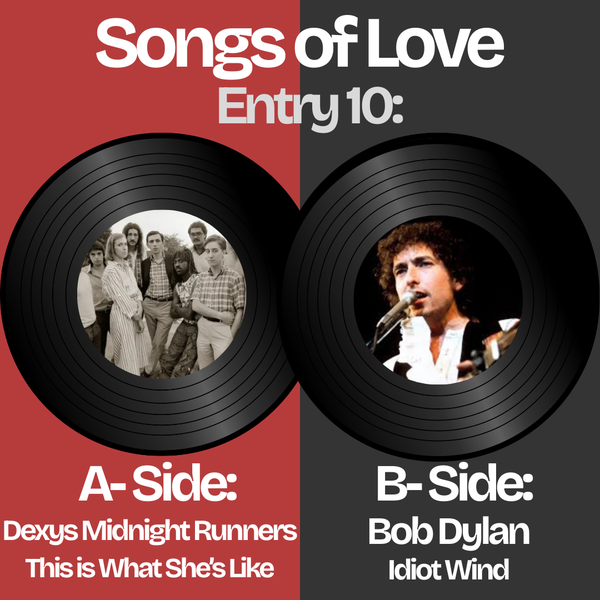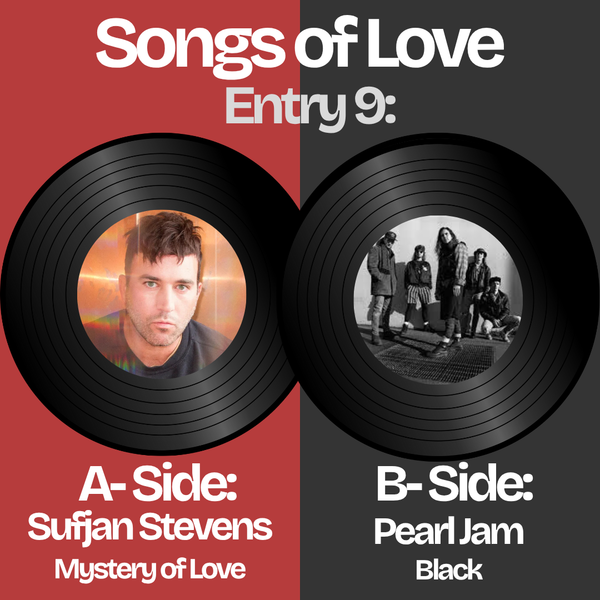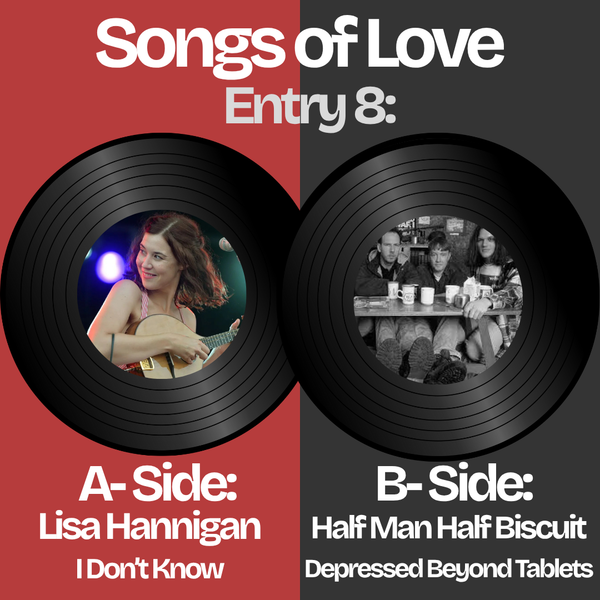Songs of Love 1
Unfortunately, I have to admit from the off that a lot of the songs in this project will, reflecting my music taste, lean white and male. There are a lot of reasons for this, some of which I’m capable of rectifying, others less so. But for that very reason, I wanted to start by covering two black women, perhaps two of the defining voices of the 20th century. I wanted to do so not only for reasons of representation, but also because in a general cultural sense, black women have a strange relationship to the concept of desire, a sharpened version of the Madonna/whore dichotomy, where they’re constructed as either entirely passive subjects, or sexually aggressive (and often emasculating in the process). Which makes it all the more important to think about desire as actually expressed by black women (albeit both of these songs are written by white male songwriters). These songs have quite different relationships to the concept of desire, and that heterogeneity is itself important to acknowledge, but in both, the desire itself is clear and unapologetic.
A-side
Performed by Aretha Franklin
Written by Burt Bacharach and Hal David
Released 1968
This is, above all, a song of obsession. The singer’s every waking thought is consumed with their lover, from the very moment of awakening on. Like the most devoted monk, they are in a state of constant prayer, but this prayer consists as much of thoughts and fantasies (“I think of us, dear”) as it does of direct appeals to the divine. And yet, more than most love songs, mundane life forms a constant, inescapable backdrop – picking out an outfit, running for the bus, taking a break from work. There’s a constant interplay here between fantasy and reality.
It’s also one of those love songs cunningly disguised as a gospel song, or at least a song of religious devotion (as opposed to songs of religious devotion disguised as love songs – see The Who’s ‘Bargain,’ for instance). For Franklin, though she wasn’t the first to record the song, this was a way of reconciling her church-based roots with her career singing songs of carnal desire. In this song, God and the lover are inextricably intertwined – the lover is not only the subject and focus of the singer’s prayers, but by the end of the song he (?) is being asked to “answer my prayer.” This identification of the divine with the beloved is both an old trick and inherently blasphemous, at least according to most orthodox Christian theology, but Franklin (or, if you prefer, Bacharach and David) joins a long, long line of poets and singers who get away with it (including, well, David – the biblical one, that is). We’ll see plenty more in this project, in fact, with various twists on the idea, and various placings of emphasis.
It's also, at least by implication, a song of specifically female desire. Unlike a lot of similar love songs which passed between hands, it’s hard to imagine Frank Sinatra or Tony Christie singing about combing their hair and wondering which dress to wear, unless by some ‘Santa Buddy’-style bowdlerisation. And this is all the more potent in the hands/voice of Aretha Franklin, wherein it becomes, as mentioned above, a statement of black female desire. The singer here gets to express her desires out loud, to herself, her lover, and God, all implicitly conjoined here in a sort of spiritual marriage.
Which gets at something else important about the desire expressed here: it is, in some sense, pure. It’s not lusting after the lover’s body (or if it is, it’s not telling us this), but after the lover in an abstract sense, their very being. It’s a spiritual kind of love, fitting with that origin in worship. There are plenty of other songs in the same tradition that are much raunchier, much more bodily – Franklin sang many herself. But this is specifically a black woman expressing a desire that is abstract, even cerebral. It’s the opposite of primal; it’s dignified and measured. Which is all the more meaningful in a song released in the year of Martin Luther King’s assassination, and performed by someone who was well acquainted with King, being a passionate civil rights activist herself.
On some level, it’s unfair to make a love song bear that kind of weight. This isn’t ‘A Change is Gonna Come’ or ‘Blowin’ in the Wind’ or ‘Everyday People’ or any other overtly political song – even ‘Respect,’ for that matter. This is an entirely personal song about individual desire. But, as always, the personal is political, and the expression of desire is a political act. Aretha Franklin could never but be read as a black woman, which is a limitation, but one which comes with opportunities. And she was never shy of seizing opportunities.
B-side
Performed by Ella Fitzgerald
Written by Cole Porter
Released 1956
Ella Fitzgerald is one of the great singers of her, perhaps any, age. In technical terms, she’s unassailable, not only in terms of her extraordinary vocal range, but the sheer precision with which she lands on every note. And yet that precision can make her feel a little distanced. She doesn’t go in for the kind of emotional extremity heard in Billie Holliday’s fragility, or the sweeps of passion characteristic of the succeeding generation of black female vocalists – Dionne Warwick, Aretha Franklin et al. She inhabits the song no less than any of them, but the emotions of it tend to be writ somewhat smaller. She lives in a measured world, calibrated to perfection.
And that approach is perfect for this, a song of understatement that masks its cynicism and its broken heart by disguising itself as an appeal. This is self-consciously not a grand romantic gesture, or the beginning of a great love affair. This is a flash in the pan, a one night stand into which both participants are going with their eyes open. When their eyes lock across a crowded room, the singer isn’t thinking “This is the one,” they’re thinking “You’ll do.”
Because “the one,” or at least “a one,” has been and gone already. This is the song of someone scrabbling around to recover themselves in the wake of a great catastrophe, and coming up short. All they can do is throw themselves back into the arena of romantic and sexual encounters, but without any real belief in what they’re doing, as if to act out some kind of empty parody of what they had until recently. Their best appeal (“don’t you want to forget someone too?”) is to their potential partner’s own heartbreak, which can be presumed to exist – after all, in a fallen, broken world like this one, who wouldn’t want to forget someone?
This is a song of unabashed desire, and yet desire itself is subject to critique, even a touch of suspicion. The singer is “strangely attracted” to this stranger, a desire which takes them by surprise. It’s not unwelcome – quite the contrary – but there’s a sense there that they had thought desire itself had deserted them. So hey, maybe it’s a hopeful song about finding a new love?
Well, no. Not at all. Because everything is “wrong” – the place, the time, even the background music. Maybe if one or some of those things were different, this whole situation could play out differently. The trouble is, the singer is someone who has been thoroughly broken by the vicissitudes of love. “There’s someone I’m trying so hard to forget” – then why mention them? It’s classic melancholia – they’re trying to free themselves from the object of their desire, but can’t seem to get there. The best they can muster, maybe, is sleeping with somebody else for a night and seeing if that helps. They don’t seem very confident that it will, but hey, it’s worth a shot.
It’s similar emotional ground to, for instance, the Beach Boys’ ‘Help Me Rhonda.’ But where that song approaches the new lover with a manic grin on its face, coming on too strong because it can’t do otherwise (but with its thoughts still drawn back inexorably to its ex), this one is altogether more world-weary, barely even mustering up the strength for a wry smile. This always feels to me like the song of someone barely holding themself together, masking their dysfunction with a veneer of self-awareness. At least for now.
Some versions of this song are languid, stretching out in their own wretchedness. This is not one of them. The energetic arrangement of this one suggests that Ella Fitzgerald is dancing up to her prospective lover, nudging them with an elbow in the process. It feels calculated, somehow. The energy is an attempt to mask the void at the heart of the song. But really it only draws attention to it. The song’s smile never quite reaches the eyes.
I actually hadn’t realised before looking up the credits that this was a Cole Porter song, but I can’t exactly say that I was shocked by the revelation. Like many of his songs, there’s a slightly jaundiced eye evident here. A sense that the world of (heterosexual?) romance is utterly poisonous, for all its attractions. But this isn’t quite sneering cynicism; this is the perspective of a disappointed idealist. That’s why the song keeps telling you this is wrong – not in a moral sense, even in a sexy way, but just fundamentally antithetical to how things should be. And even if this charming stranger is free some night, it’s hard to see a happy ending to that.



